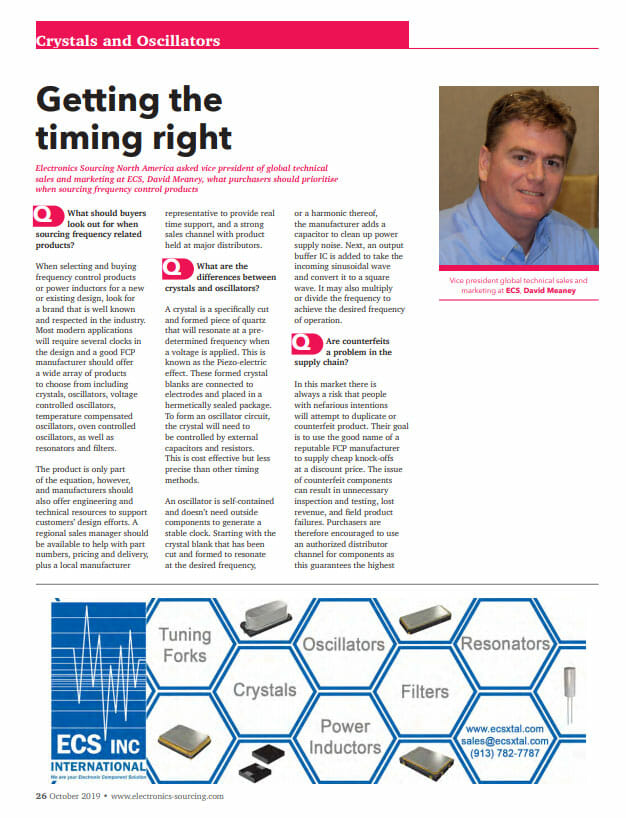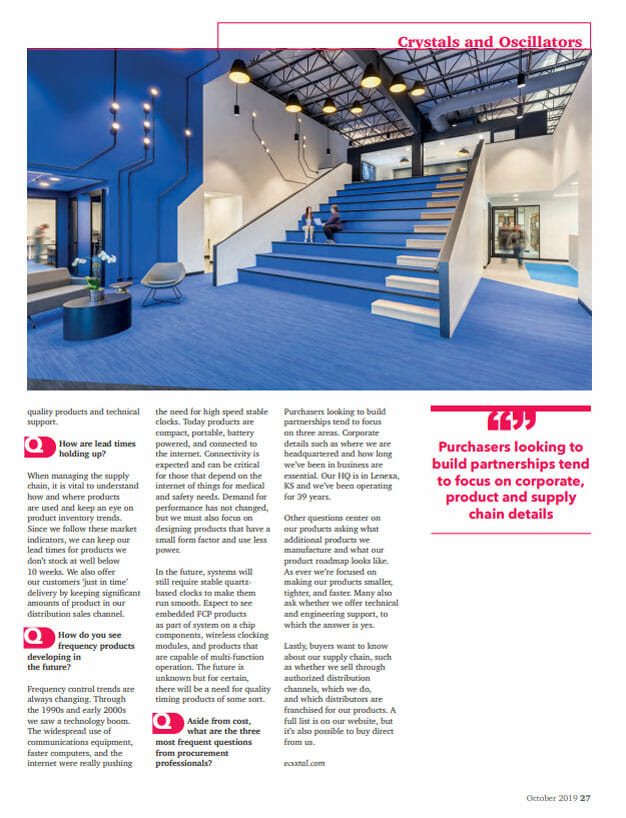
Written by David Meaney, Vice President of Global Technical Sales and Marketing
What should buyers look out for when sourcing frequency related products?
When selecting and buying frequency control products or power inductors for a new or existing design, look for a brand that is well known and respected in the industry. Most modern applications will require several clocks in the design and a good FCP manufacturer should offer a wide array of products to choose from including crystals, oscillators, voltage controlled oscillators, temperature compensated oscillators, oven controlled oscillators, as well as resonators and filters. The product is only part of the equation, however, and manufacturers should also offer engineering and technical resources to support customers’ design efforts. A regional sales manager should be available to help with part numbers, pricing and delivery, plus a local manufacturer representative to provide real time support, and a strong sales channel with product held at major distributors.
What are the differences between crystals and oscillators?
A crystal is a specifically cut and formed piece of quartz that will resonate at a predetermined frequency when a voltage is applied. This is known as the Piezo-electric effect. These formed crystal blanks are connected to electrodes and placed in a hermetically sealed package. To form an oscillator circuit, the crystal will need to be controlled by external capacitors and resistors. This is cost effective but less precise than other timing methods. An oscillator is self-contained and doesn’t need outside components to generate a stable clock. Starting with the crystal blank that has been cut and formed to resonate at the desired frequency, or a harmonic thereof, the manufacturer adds a capacitor to clean up power supply noise. Next, an output buffer IC is added to take the incoming sinusoidal wave and convert it to a square wave. It may also multiply or divide the frequency to achieve the desired frequency of operation.
Are counterfeits a problem in the supply chain?
In this market there is always a risk that people with nefarious intentions will attempt to duplicate or counterfeit product. Their goal is to use the good name of a reputable FCP manufacturer to supply cheap knock-offs at a discount price. The issue of counterfeit components can result in unnecessary inspection and testing, lost revenue, and field product failures. Purchasers are therefore encouraged to use an authorized distributor channel for components as this guarantees the highest quality products and technical support.
How are lead times holding up?
When managing the supply chain, it is vital to understand how and where products are used and keep an eye on product inventory trends. Since we follow these market indicators, we can keep our lead times for products we don’t stock at well below 10 weeks. We also offer our customers ‘just in time’ delivery by keeping significant amounts of product in our distribution sales channel.
How do you see frequency products developing in the future?
Frequency control trends are always changing. Through the 1990’s and early 2000’s we saw a technology boom. The widespread use of communications equipment, faster computers, and the internet were really pushing the need for high speed stable clocks. Today products are compact, portable, battery powered, and connected to the internet. Connectivity is expected and can be critical for those that depend on the internet of things for medical and safety needs. Demand for performance has not changed, but we must also focus on designing products that have a small form factor and use less power. In the future, systems will still require stable quartzbased clocks to make them run smooth. Expect to see embedded FCP products as part of system on a chip components, wireless clocking modules, and products that are capable of multi-function operation. The future is unknown but for certain, there will be a need for quality timing products of some sort.
Aside from cost, what are the three most frequent questions from procurement professionals?
Purchasers looking to build partnerships tend to focus on three areas. Corporate details such as where we are headquartered and how long we’ve been in business are essential. Our HQ is in Lenexa, KS and we’ve been operating for 39 years. Other questions center on our products asking what additional products we manufacture and what our product roadmap looks like. As ever we’re focused on making our products smaller, tighter, and faster. Many also ask whether we offer technical and engineering support, to which the answer is yes. Lastly, buyers want to know about our supply chain, such as whether we sell through authorized distribution channels, which we do, and which distributors are franchised for our products. A full list is on our website, but it’s also possible to buy direct from us.

